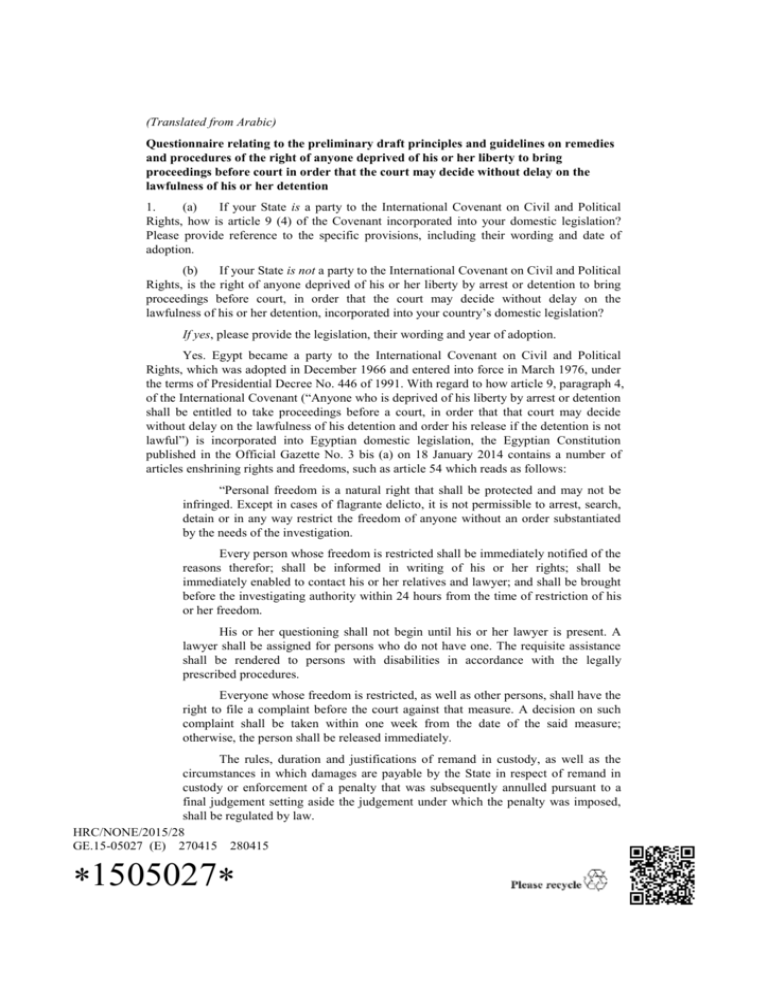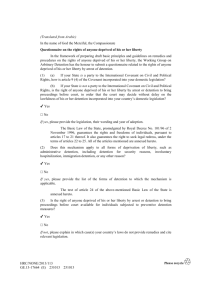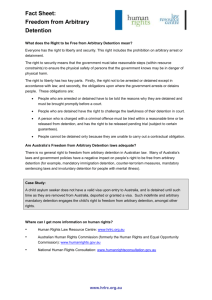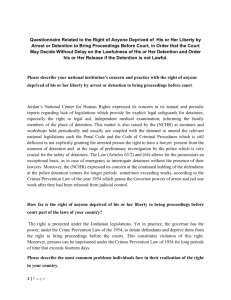Submission from Egypt in English (Word)
advertisement

(Translated from Arabic) Questionnaire relating to the preliminary draft principles and guidelines on remedies and procedures of the right of anyone deprived of his or her liberty to bring proceedings before court in order that the court may decide without delay on the lawfulness of his or her detention 1. (a) If your State is a party to the International Covenant on Civil and Political Rights, how is article 9 (4) of the Covenant incorporated into your domestic legislation? Please provide reference to the specific provisions, including their wording and date of adoption. (b) If your State is not a party to the International Covenant on Civil and Political Rights, is the right of anyone deprived of his or her liberty by arrest or detention to bring proceedings before court, in order that the court may decide without delay on the lawfulness of his or her detention, incorporated into your country’s domestic legislation? If yes, please provide the legislation, their wording and year of adoption. Yes. Egypt became a party to the International Covenant on Civil and Political Rights, which was adopted in December 1966 and entered into force in March 1976, under the terms of Presidential Decree No. 446 of 1991. With regard to how article 9, paragraph 4, of the International Covenant (“Anyone who is deprived of his liberty by arrest or detention shall be entitled to take proceedings before a court, in order that that court may decide without delay on the lawfulness of his detention and order his release if the detention is not lawful”) is incorporated into Egyptian domestic legislation, the Egyptian Constitution published in the Official Gazette No. 3 bis (a) on 18 January 2014 contains a number of articles enshrining rights and freedoms, such as article 54 which reads as follows: “Personal freedom is a natural right that shall be protected and may not be infringed. Except in cases of flagrante delicto, it is not permissible to arrest, search, detain or in any way restrict the freedom of anyone without an order substantiated by the needs of the investigation. Every person whose freedom is restricted shall be immediately notified of the reasons therefor; shall be informed in writing of his or her rights; shall be immediately enabled to contact his or her relatives and lawyer; and shall be brought before the investigating authority within 24 hours from the time of restriction of his or her freedom. His or her questioning shall not begin until his or her lawyer is present. A lawyer shall be assigned for persons who do not have one. The requisite assistance shall be rendered to persons with disabilities in accordance with the legally prescribed procedures. Everyone whose freedom is restricted, as well as other persons, shall have the right to file a complaint before the court against that measure. A decision on such complaint shall be taken within one week from the date of the said measure; otherwise, the person shall be released immediately. The rules, duration and justifications of remand in custody, as well as the circumstances in which damages are payable by the State in respect of remand in custody or enforcement of a penalty that was subsequently annulled pursuant to a final judgement setting aside the judgement under which the penalty was imposed, shall be regulated by law. HRC/NONE/2015/28 GE.15-05027 (E) 270415 280415 HRC/NONE/2015/28 It is not permissible, under any circumstances, to try an accused person for offences punishable by imprisonment unless a lawyer, appointed by the accused or assigned by the court, is present.” Article 56, paragraph 2, of the Constitution further stipulates that: “Prisons and places of detention shall be subject to judicial supervision and acts which are incompatible with human dignity or which endanger human health shall be prohibited therein.” Under article 59 of the Constitution: “Everyone has the right to security of person. The State shall ensure security and peace of mind for its citizens and all persons residing in its territory.” Under article 92 of the Constitution: “The inalienable rights and freedoms of citizens are non-suspendable and non-derogable. No law regulating the exercise of rights and freedoms may restrict such rights and freedoms in a manner prejudicial to the substance and the essence thereof.” Under article 93 of the Constitution: “The State shall be bound by the international human rights treaties, covenants and conventions that Egypt has ratified and which shall have the force of law after their publication in accordance with the prescribed procedures.” Under article 94 of the Constitution: “The rule of law shall form the basis of governance in the State. The State shall be subject to the law. The independence, immunity and impartiality of the judiciary are fundamental safeguards for the protection of rights and freedoms.” Article 36 of the Code of Criminal Procedure (Act No. 150 of 1950, promulgated on 3 September 1950 and published in the Official Gazette on 15 October 1951) stipulates as follows: “The criminal investigation officer shall immediately hear the statements of the arrested suspect who, if he fails to establish his innocence, shall be brought before the office of the competent public prosecutor within 24 hours. The office of the public prosecutor shall question him within 24 hours, after which it shall order either his remand in custody or his release.” Under the terms of article 40 of the Code of Criminal Procedure, most recently amended on 28 September 1972: “No one shall be arrested or detained except by order of the legally competent authorities. Any person who is arrested or detained shall be treated in a manner conducive to the preservation of his human dignity and shall not be subjected to physical or mental harm.” Under the terms of article 42 of the Code of Criminal Procedure, most recently amended on 25 December 1952: “Members of the Department of Public Prosecutions and presidents and vice-presidents of courts of first instance shall be empowered to inspect the public and central prisons situated within their areas of jurisdiction in order to ascertain that no one is being detained unlawfully. They shall have the right to examine prison records and arrest and detention orders, take copies thereof, contact any detainee and hear any complaint that he might wish to submit to them. The prison governors and staff shall provide them with any assistance needed to obtain the information that they request.” Under article 43 of the same Code, most recently amended on 25 December 1952: “Every prisoner shall be entitled to submit a written or verbal complaint to a prison officer, at any time, and request that he transmit it to the office of the public prosecutor. The officer shall receive and immediately transmit it after entering it in the prison complaints register. Anyone who comes to know that a person is being detained unlawfully or in a place not designated for such purpose shall notify a member of the office of the public prosecutor who, on receipt of such notification, shall go immediately to the place in which the person is being held where he shall investigate the matter, order the release of the person if he is being detained unlawfully, and draw up a report thereon.” GE.15-05027 2 HRC/NONE/2015/28 2. Does this mechanism apply to all forms of deprivation of liberty, such as administrative detention, including detention for security reasons, involuntary hospitalization, immigration detention, or any other reason? Yes. This mechanism applies to all forms of deprivation of liberty, bearing in mind the fact that Egyptian legislation makes no provision for so-called administrative detention or detention for security reasons. Have the constitutional or higher courts in your country issued any rulings concerning the right of any person deprived of his or her liberty by arrest or detention to bring proceedings before court? If yes, please provide the list of the forms of detention to which the mechanism is applicable. Yes. The Egyptian Court of Cassation has issued numerous rulings concerning the right of persons deprived of their liberty to seek legal remedy. These include: Whereas article 40 of the Code of Criminal Procedure stipulates that “no one shall be arrested or detained except by order of the legally competent authorities”; whereas it has been established that the detention order dated 11 September 1965 and forming the subject of the objection was issued by the President of the Republic pursuant to Act No. 119 of 1964 concerning various State security measures, article 1 of which stipulated that “it shall be permissible, on the basis of a presidential decree, to arrest the following categories of persons and detain them at a secure location …”; whereas the Supreme Constitutional Court ruled, on 1 April 1978 in case No. 5/Judicial Year 7/Constitutional, that the aforementioned article 1 of Act No. 119 of 1964 was unconstitutional; whereas a ruling in which a provision of a law or regulation is declared unconstitutional implies that the said provision is no longer applicable from the day following that on which the ruling is made known, and bearing in mind the fact that, under the case law of this Court, the non-applicability of such a provision has not only prospective but also retroactive effect in respect of occurrences and contexts preceding the issuance of the ruling on the unconstitutionality of the provision except in the case of rights and situations that have acquired the force of res judicata through a final judgement or expiration of the statute of limitations; whereas the regrettable judgement forming the subject of the objection led to dismissal of the appellants’ argument on the ground that the right to bring an action had been extinguished under the three-year statute of limitations; whereas the retroactivity of the ruling on the unconstitutionality of article 1 of the aforementioned Act No. 119 of 1964 is not excluded and implies the nonapplicability of that provision to the contested detention; and whereas, in consequence, the presidential decree under which the detention was ordered was tantamount to an ex parte decision that was illegitimate insofar as it had no legal basis and, in fact, constituted a flagrant breach of the law and was vitiated by a serious flaw that made it a legally invalid material act insofar as it entailed an infringement of personal liberty and thereby forfeited its administrative prerogative and the impunity granted in respect of administrative decisions; the regular courts are therefore competent to redress the consequences resulting from the said material act. [Objection No. 646 – Judicial Year 58 – hearing of 14 June 1990 – archive 41 – volume 2 – page 299 – objection dismissed] It should be noted that, on 24 January 2012, the Chairman of the Supreme Council of the Armed Forces issued Decision No. 59 of 2012 under which the provisions of the decree declaring a state of emergency throughout the Republic ceased to be applicable with effect from 25 January 2012 except in respect of crimes of thuggery. 3 GE.15-05027 HRC/NONE/2015/28 3. Is the right of anyone deprived of his or her liberty by arrest or detention to bring proceedings before court available for individuals subjected to preventive detention measures? If not, please explain in which case(s) your country’s laws do not provide remedies and cite relevant legislation. Yes. Under Egyptian law (article 43 of the aforementioned Code of Criminal Procedure), any detainee or other person has the right to report an unlawful detention to the office of the public prosecutor. Egyptian law makes no provision for so-called “preventive detention measures”. 4. Does this mechanism provide for any particular remedies? In particular, does the mechanism provide for release and compensation for unlawful detention? If yes, please state and explain the relevant remedies. Yes. We would like to draw attention to the fact that, under the terms of article 99 of the Egyptian Constitution: “Any violation of personal freedom, of the sacrosanct nature of the private life of citizens, or of any other public rights and freedoms guaranteed by the Constitution and the law, constitutes a criminal offence and criminal and civil actions brought in respect thereof shall not be statute-barred. The victim shall have the right to bring a direct criminal action.” The provisions of that article are illustrated by the fact that anyone deprived unlawfully of his or her liberty has the right to bring a direct action before a criminal court against the person responsible and is likewise entitled to institute civil proceedings. The Constitution explicitly stipulates that neither civil nor criminal proceedings in respect of acts of unlawful detention are statute-barred. The Egyptian Code of Criminal Procedure also makes provision, in a number of articles to which reference has already been made, for a mechanism to ensure the release of anyone deprived unlawfully of his or her liberty. With regard to compensation, article 163 of the Egyptian Civil Code (Act No. 131 of 1948 promulgated on 16 July 1948 and published in the Official Gazette on 29 July 1948) stipulates that: “Any culpable act that causes damage to another person shall render the perpetrator liable to payment of compensation.” Accordingly, pursuant to the provisions of that article, anyone who is detained unlawfully has the right to claim compensation from the person responsible for his or her detention or from the State. 5. Are there persons other than the detainee who can initiate the procedure on behalf of the detainee under your country’s domestic law? If yes, please state who. Yes. Under the provisions of article 43 of the Egyptian Code of Criminal Procedure, to which we have already referred, anyone who comes to know that a person is being detained unlawfully has the right to notify the authorities thereof. 6. What are the formal requirements and procedures for the detainee to invoke the right to bring proceedings before court in order that the court may decide without delay on the lawfulness of the detention? The procedures consist in notification of the locally competent office of the public prosecutor, which forms an integral part of the judiciary in accordance with article 189 of the current Egyptian Constitution. Under article 43 of the Code of Criminal Procedure, an official from the office of the public prosecutor has an obligation to go immediately to the place of detention and take the legally prescribed measures, including release of the victim and prosecution of the culprit on the charge of unlawful detention. 7. Does the legislation provide for a time limit for submitting such application to the court? If so, please indicate what is the maximum time in days, months or years. GE.15-05027 4 HRC/NONE/2015/28 The Egyptian Code of Criminal Procedure does not specify a time limit for the submission of such application. 8. Are there any major decisions of your country’s Constitutional or Supreme Courts concerning the right of anyone deprived of his or her liberty by arrest or detention to bring proceedings before court? If yes, please provide the date and number of the decision(s) and, if possible, a copy of the decision(s). Yes. The Supreme Constitutional Court has issued rulings concerning the right of anyone deprived of his or her liberty to bring proceedings before court, as illustrated by the following: 1. Whereas article 40 of the Code of Criminal Procedure stipulates that “no one shall be arrested or detained except by order of the legally competent authorities”; whereas it has been established that the detention order dated 11 September 1965 and forming the subject of the objection was issued by the President of the Republic pursuant to Act No. 119 of 1964 concerning various State security measures, article 1 of which stipulated that “it shall be permissible, on the basis of a presidential decree, to arrest the following categories of persons and detain them at a secure location …”; whereas the Supreme Constitutional Court ruled, on 1 April 1978 in case No. 5/Judicial Year 7/Constitutional, that the aforementioned article 1 of Act No. 119 of 1964 was unconstitutional; whereas a ruling in which a provision of a law or regulation is declared unconstitutional implies that the said provision is no longer applicable from the day following that on which the ruling is made known, and bearing in mind the fact that, under the case law of this Court, the nonapplicability of such a provision has not only prospective but also retroactive effect in respect of occurrences and contexts preceding the issuance of the ruling on the unconstitutionality of the provision except in the case of rights and situations that have acquired the force of res judicata through a final judgement or expiration of the statute of limitations; whereas the regrettable judgement forming the subject of the objection led to dismissal of the appellants’ argument on the ground that the right to bring an action had been extinguished under the three-year statute of limitations; whereas the retroactivity of the ruling on the unconstitutionality of article 1 of the aforementioned Act No. 119 of 1964 is not excluded and implies the nonapplicability of that provision to the contested detention; and whereas, in consequence, the presidential decree under which the detention was ordered was tantamount to an ex parte decision that was illegitimate insofar as it had no legal basis and, in fact, constituted a flagrant breach of the law and was vitiated by a serious flaw that made it a legally invalid material act insofar as it entailed an infringement of personal liberty and thereby forfeited its administrative prerogative and the impunity granted in respect of administrative decisions; the regular courts are therefore competent to redress the consequences resulting from the said material act. [Objection No. 646 – judicial year 58 – hearing of 14 June 1990 – archive 41 – volume 2 – page 299 – objection dismissed] 2. Whereas the established practice in accordance with article 40 of the Code of Criminal Procedure is that no one may be arrested or detained except by order of the legally competent authorities; whereas, under the provisions of article 126 of the said Code which apply to investigations conducted by the Department of Public Prosecutions, the authority investigating any matter is empowered to issue, as required, an order for the appearance or arrest of a suspect and, under the provisions of article 127 of the Code, every arrest warrant issued by the investigating authority 5 GE.15-05027 HRC/NONE/2015/28 must contain the suspect’s name, surname, occupation and place of residence as well as the charge against him, the date of the warrant, the signature of the person who issued it and the official stamp; whereas this implies that a request from the Department of Public Prosecutions for the police to seek and take into custody an unidentified offender does not constitute a legally valid arrest warrant insofar as article 127 of the Code of Criminal Procedure explicitly stipulates that the suspect against whom the arrest warrant is issued must be identified; whereas the judgement forming the subject of the objection took a contrary view and the reason given to justify dismissal of the appellant’s argument contesting the validity of the search and arrest procedures was neither consistent with the law nor conducive to the fulfilment of the obligations that it imposes; the said judgement was therefore vitiated by a flawed application of the law that precluded consideration of evidence in the case, including the appellant’s confession, which was not made irrelevant by other evidence referred to in the judgement since items of evidence in criminal matters are mutually supportive and, in aggregate, shape the judge’s opinion while, if any such item is omitted or excluded, it is impossible to determine the extent to which this suppressed evidence might have influenced the court’s final verdict. [Objection No. 1457 – judicial year 48 – hearing of 31 December 1978 – archive 29 – volume 1 – page 993] 3. (Due process, whether in regard to the impartiality of the investigator or a guarantee of the liberty of person and human dignity of the accused, and respect for the rights of defence are legal principles that are enshrined in the Constitution and the law and the protection of which is advocated by the judiciary not solely in the interests of the accused since they are regarded primarily as being conducive to a common interest consisting in protection of the presumption of innocence and the promotion of peace of mind among the general public concerning the fairness of the judicial system. To this end, article 41 of the Constitution stipulates that personal freedom is a natural right that shall be protected and may not be infringed. Except in cases of flagrante delicto, it is not permissible to arrest, search, detain or in any way restrict the liberty or freedom of movement of anyone without an order substantiated by the need to conduct an investigation and safeguard the community. Such order is issued by the competent judge or the Department of Public Prosecutions in accordance with the provisions of the law. Article 42 of the Constitution further stipulates that any citizen who is arrested, detained or in any way restricted in his freedom must be treated in a manner conducive to the preservation of his human dignity and must not be subjected to physical or mental harm; he must not be detained or imprisoned in places that are not subject to the legislation regulating prisons and any statement found to have been made by a citizen as a result or under threat of any of the above is null and void and inadmissible as evidence. A similar stipulation can be found in article 302 of the Code of Criminal Procedure.) [Objection No. 18753 – judicial year 65 – hearing of 15 December 1998 – archive 49 – volume 1 – page 1456 – objection dismissed] It is noteworthy that, in the judicial year 2014/15, the Supreme Administrative Court assigned its first division to hear appeals relating to public rights and freedoms, including unlawful detention. GE.15-05027 6






